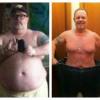-
Content Count
445 -
Joined
-
Last visited
Reputation Activity
-
 Norma got a reaction from LvNicole in Do you crave sweets?
Norma got a reaction from LvNicole in Do you crave sweets?
I do not crave sweets at all like I did before surgery. I could not even think of eating a whole cookie or a piece of cake or a regular sized candy bar. I think that food has finally become something to keep me alive rather than something that I have to have every 2 hours because I am starving. I am not worried about food and I don't crave it or think about it ever waking moment anymore. The sleeve is a miracle for me.
-
 Norma got a reaction from LvNicole in Do you crave sweets?
Norma got a reaction from LvNicole in Do you crave sweets?
I do not crave sweets at all like I did before surgery. I could not even think of eating a whole cookie or a piece of cake or a regular sized candy bar. I think that food has finally become something to keep me alive rather than something that I have to have every 2 hours because I am starving. I am not worried about food and I don't crave it or think about it ever waking moment anymore. The sleeve is a miracle for me.
-
 Norma got a reaction from SMB335 in Sad, Mad and Disappointed
Norma got a reaction from SMB335 in Sad, Mad and Disappointed
We both got the Vertical Sleeve, Mine was Oct 30, 009 and I have lost 80+ pounds since then. I only weigh on the 30th of the month so will weigh again the last day of Feb. I have gone from size 28 and 30 to size 18/20. My diabetes has improved dramatically--only taking 5 units of Novolog 2x a day now. I had unexpected total knee replacement surgery on right knee on Dec 15th as my knee finally blew backwards and had no stability. However, I am thrilled that the weight loss from the sleeve has helped so much with my knee recovery. I am now able to do cardio exercise and hope to be released from physical therapy soon. I bleieve that Dr. Aceves saved my life with his excellent surgery skills by finally allowing me to get a grip on how I use food in my life. I am never hungry and have lost my raging sweet tooth. I was able to fund the $9000 through flex spend and cutting expenses by moving in with friends. Since surgery, I can eat from the appetizer menus when out to eat or will get a side item and share an entree with my friends. I utilized the clothing exchange here on VST so have not had to buy more than underwear, shoes and a new winter coat. My food costs are less than 1/5 of what I used to spend. My pharmacy costs have also been reduced by 70%. Best decision I ever made in my life was going to Mexico and getting the sleeve.
-
 Norma got a reaction from RickyDee in Therapy Issues-Mental Health
Norma got a reaction from RickyDee in Therapy Issues-Mental Health
Being obese in America is hard-even traumatic. We are discriminated against for being "fat, lazy slobs" and expected to be "jolly" all the time. We are treated rudely by store clerks, doctors, flight attendants, etc and considered to have no will power and to eat all the wrong foods and know nothing about nutrition. We learn to have guilt and feel shame about ourselves, our appearance, our eating habits, our sexual needs, etc. We even start discriminating against ourselves with the same mores of our culture.
My experience as an obese person for 45 years and a Licensed Professional Counselor for over 20 years has led me to some conclusions about our therapy needs while undergoing a lifestyle change as is possible with the sleeve. I do not think we need the services of a bariactric specialist who specializes in bulumia or anorexia. Most of us have considerable knowledge of nutrition and don't need another diet plan or to be told what foods we should eat.
Therapy needs to be centered around the traumas( yes, I mean TRAUMAS) that we have suffered through being discriminated against, ridiculed and ignored and the guilt and shame we feel about our eating, our size, our value to society, the way we have learned to hide what we eat, and the way we connect food with love and nuturance. We need to learn to accept ourselves for who we are and how we got here. Work can be done on reframing the importance that food has on our happiness and in our lives. We need to be able to "eat to live" rather than "live to eat". Food does not need to consume every waking moment in our lives; we should have other interests and activities than always planning our next meal or snack or eating.
For these reasons, I suggest that people find a counselor who specializes in DBT or EMDR. We need to reprogram our thinking and emotions as they relate to food and as they relate to shame, guilt, embarrassment, intimacy and love. That therapy will allow us to strive with the tool of the sleeve. Hope these words have helped. Feel free to PM me if you have futher questions that you do not feel comfortable posting here.:thumbup1:
-
 Norma got a reaction from RickyDee in Therapy Issues-Mental Health
Norma got a reaction from RickyDee in Therapy Issues-Mental Health
I will break down the two types of therapy. Hope this is not too technical. Will do EMDR in a separate post.
DBT stands for Dialectical Behavior Therapy--this technique was developed by Marsha Lineham to work with people with Borderline Personality Disorder. (I am NOT saying that obese people have this disorder, but many obese people CAN benefit from this type of therapy). It is based on the following ideas:
Mindfulness is the capacity to pay attention, nonjudgmentally, to the present moment. Mindfulness is all about living in the moment, experiencing one's emotions and senses fully, yet with perspective. It is considered a foundation for the other skills taught in DBT, because it helps individuals accept and tolerate the powerful emotions they may feel when challenging their habits or exposing themselves to upsetting situations. The concept of mindfulness and the meditative exercises used to teach it are derived from traditional Buddhist practice, though the version taught in DBT does not involve any religious or metaphysical concepts. Interpersonal response patterns taught in DBT skills training are very similar to those taught in many assertiveness and interpersonal problem-solving classes. They include effective strategies for asking for what one needs, saying no, and coping with interpersonal conflict.
Individuals frequently possess good interpersonal skills in a general sense. The problems arise in the application of these skills to specific situations. An individual may be able to describe effective behavioral sequences when discussing another person encountering a problematic situation, but may be completely incapable of generating or carrying out a similar behavioral sequence when analyzing his or her own situation.
The interpersonal effectiveness module focuses on situations where the objective is to change something (e.g., requesting that someone do something) or to resist changes someone else is trying to make (e.g., saying no). The skills taught are intended to maximize the chances that a person?s goals in a specific situation will be met, while at the same time not damaging either the relationship or the person?s self-respect. Emotion regulation:
Identifying and labeling emotions
Identifying obstacles to changing emotions
Reducing vulnerability to emotion mind
Increasing positive emotional events
Increasing mindfulness to current emotions
Taking opposite action
Applying distress tolerance techniques
Distress tolerance
Many current approaches to mental health treatment focus on changing distressing events and circumstances. They have paid little attention to accepting, finding meaning for, and tolerating distress. This task has generally been tackled by psychodynamic, psychoanalytic, gestalt, or narrative therapies, along with religious and spiritual communities and leaders. Dialectical behavior therapy emphasizes learning to bear pain skillfully. Distress tolerance skills constitute a natural development from mindfulness skills. They have to do with the ability to accept, in a non-evaluative and nonjudgmental fashion, both oneself and the current situation. Although this is a nonjudgmental stance, this does not mean that it is one of approval or resignation. The goal is to become capable of calmly recognizing negative situations and their impact, rather than becoming overwhelmed or hiding from them. This allows individuals to make wise decisions about whether and how to take action, rather than falling into the intense, desperate, and often destructive emotional reactions that are part of borderline personality disorder.
Skills for acceptance include radical acceptance, turning the mind toward acceptance, and distinguishing between "willingness" (acting skillfully, from a realistic understanding of the present situation) and "willfulness" (trying to impose one's will regardless of reality). Participants also learn four crisis survival skills, to help deal with immediate emotional responses that may seem overwhelming: distracting oneself, self-soothing, improving the moment, and thinking of pros and cons.
-
 Norma got a reaction from RickyDee in Therapy Issues-Mental Health
Norma got a reaction from RickyDee in Therapy Issues-Mental Health
Being obese in America is hard-even traumatic. We are discriminated against for being "fat, lazy slobs" and expected to be "jolly" all the time. We are treated rudely by store clerks, doctors, flight attendants, etc and considered to have no will power and to eat all the wrong foods and know nothing about nutrition. We learn to have guilt and feel shame about ourselves, our appearance, our eating habits, our sexual needs, etc. We even start discriminating against ourselves with the same mores of our culture.
My experience as an obese person for 45 years and a Licensed Professional Counselor for over 20 years has led me to some conclusions about our therapy needs while undergoing a lifestyle change as is possible with the sleeve. I do not think we need the services of a bariactric specialist who specializes in bulumia or anorexia. Most of us have considerable knowledge of nutrition and don't need another diet plan or to be told what foods we should eat.
Therapy needs to be centered around the traumas( yes, I mean TRAUMAS) that we have suffered through being discriminated against, ridiculed and ignored and the guilt and shame we feel about our eating, our size, our value to society, the way we have learned to hide what we eat, and the way we connect food with love and nuturance. We need to learn to accept ourselves for who we are and how we got here. Work can be done on reframing the importance that food has on our happiness and in our lives. We need to be able to "eat to live" rather than "live to eat". Food does not need to consume every waking moment in our lives; we should have other interests and activities than always planning our next meal or snack or eating.
For these reasons, I suggest that people find a counselor who specializes in DBT or EMDR. We need to reprogram our thinking and emotions as they relate to food and as they relate to shame, guilt, embarrassment, intimacy and love. That therapy will allow us to strive with the tool of the sleeve. Hope these words have helped. Feel free to PM me if you have futher questions that you do not feel comfortable posting here.:thumbup1:
-
 Norma got a reaction from longlong10 in Getting Started
Norma got a reaction from longlong10 in Getting Started
Welcome Judy! It sounds like you have a great attitude and lots of support. Hope you enjoy VST and ask any question you have.
-
 Norma got a reaction from BabyHuey in down to a size 12
Norma got a reaction from BabyHuey in down to a size 12
Clothes are a big issue for me too. I love Lane Bryant and am glad that finally there are cute and fun clothes in my size, but I just dream of being able to go into a regular store and get clothes off the rack. I have hated the terms for large size clothing since I wore Chubbies in grade school!
I will have to be careful not to become "addicted to clothes shopping" when I get to have the sleeve and experience real and lasting weight loss. But, it will be a healthier addiction!
-
 Norma got a reaction from Sharon Baugher Nickell in Kansas or Missouri Sleevers?
Norma got a reaction from Sharon Baugher Nickell in Kansas or Missouri Sleevers?
Anyone from the Middle of the beltbuckle? I am in Olathe KS now but have lived in Springfield Mo, Hannibal Mo, Dearborn MO, and would love to meet some people locally to chat with.:001_wub:
-
 Norma got a reaction from Gracey in Depression After Gastric Sleeve Surgery
Norma got a reaction from Gracey in Depression After Gastric Sleeve Surgery
It makes perfect sense that depression might be related to having surgery. Surgery is causing some changes with how you cope with issues in your life that you might not have had to deal with at all by being obese--for example, being seen by the opposite sex, being in competition with friends, being out in public, and not being able to fill your emotional needs with eating, just to name a few.
Finding a therapist equipt to deal with this--first, you can pm me if you want and i will be happy to help you find a therapist in your area. If you have insurance, look on the back of your card for a mental health number. Call and ask for someone who specializes or has experience with weight loss or bariatrics and with depression, self image, and food addictions. Most therapist will do a phone screening in which you can ask questions about cost, time frames and scheduling and get a feel for the therapist. If they don't do phone screening, their first appointment should be a free consult. If you don't have insurance, see if your employer has an Employee assistance program-that usually qualifies you for 6 free sessions with your EAP therapist group. I would recommend EMDR, a type of therapy which takes the emotional overtones and disconnects them from events/memories of situations that you have experienced and allows you to look at situations more factually to resolve current issues. For example, if your family insulted you over eating choices and that happened on the same day that a boyfriend stood you up on Prom night, your brain might have wired a connection between rejection and food and shame. EMDR can separate that connection in a really short time which will keep you from having to engage in years of therapy.









